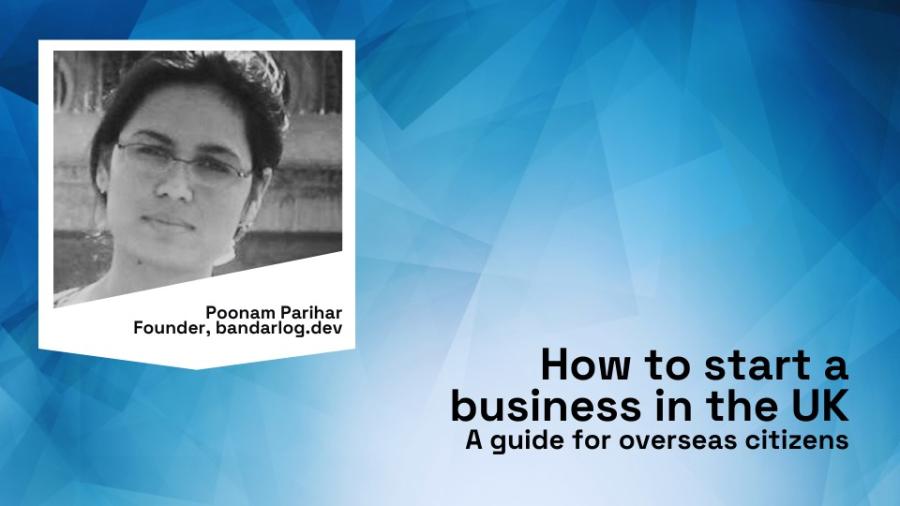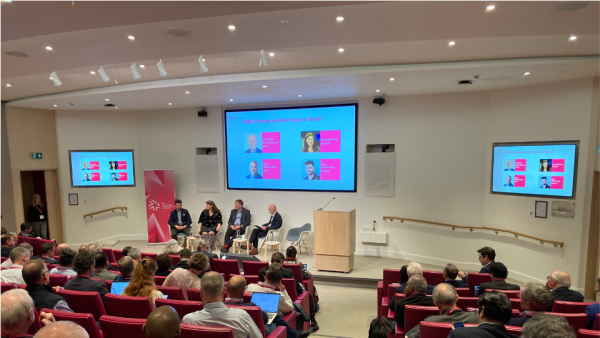
Building on the UK’s regional and national strengths, UKTIN’s Clusters Programme has been designed to ensure the UK can benefit from a thriving and resilient telecoms sector. In a recent meeting, Poonam Parihar, founder of bandarlog.dev shared her insights into establishing a tech start-up as a non-UK-national.
Please introduce yourself and your business.
I have been working in the telecoms industry for over two decades, mostly based in the US, and focusing on network technologies. I have experience both in product development and sales engineering, and my customers included AT&T; Verizon; Comcast; Bloomberg; Reuters; J&J; JP Morgan; Morgan Stanley; NY City Council; the University of Penn; and more. In May 2021, I moved to the UK and founded bandarlog.dev: a deep tech start-up aiming to transform network infrastructure for SMEs in challenging sectors such as the creative and construction industries using network automation and AI.
Building innovative technology that is sustainable and green is very important to me. Our work focuses on the core network design and integrating AI and machine learning to orchestrate and manage next generation networks. We also use edge computing to build services and business applications within the domain.
We are at early release stage of our business, have received great traction from investors and have accumulated clients and collaborative partners. We are part of organisations such ETSI, WBBA, Metaverse standards forum and more, and supported by Innovate UK and UKTIN.Please explain your path to establishing a start-up in the UK as a non-national.
I am a solo female Asian founder from India and the US. I have a master’s degree in information technology and completed the Executive Education on Startup innovation at Harvard Business School. I started my business with four advisors, also my former colleagues and mentors, who are distinguished engineers and technology business executives, and all based in the US. As a first-time founder I wanted to have the flexibility to not just run any unicorn business but be able to do pursue my technology goals and enjoy doing what I do the best.
Registering a limited company is perhaps the easiest part for any one local or non-national here in the UK and the accounting process is also pretty-straight forward; beyond which there are further aspects pertaining to running a technology business. There are advantages and disadvantages of establishing a business in certain regions, for instance access to private investors or government funding. It also helps to be able to collaborate with academia or the spin outs from the universities as there are many government funded projects led by academia. Of course I first began by attending events, heavily networking and connecting with my counterparts, both in UK and Europe, that I had already worked remotely with while in New York.
Having both the business skills and technology expertise - and being grounded in this industry for so long - are perhaps my biggest advantages. Everything else however, including coming from outside, being a female, a brown leader and a solo founder at that, not to mention in the deep tech area, added on to the challenges that I continuously struggle with.- Can you tell us more about those challenges?
My technology sales records helped me to secure a leadership visa and move to the UK, though this was not without its challenges: in the US, industry experience is more valued than I’ve found it to be here. In a customer facing role along with your technical skills, the business acumen, understanding customer issues and architecting a solution for their specific needs becomes the priority, and technology takes a backseat.
I dropped out of my PhD: I didn’t regret this decision until I moved to the UK where academia seem to take more priority. It’s easier to get into the ecosystem and establish yourself with a PhD. Now that I think about it, a learned decision would have been to work here for a while and network with the right people before starting a business, since it did take me a good amount of time to understand the landscape, do the market analysis, learn about the grants and other funding opportunities, and find the business support I needed. It was a long, rigorous, and extremely time-consuming task as I collected business use cases and went through the industry sectors that had the most demand for what I was working on. All of that kept me from being able to innovate and use my hours on the technology, which as I speak is also evolving at an unprecedented rate. - Do you have any tips for other non-nationals?
The “Innovator Founder” (Entrepreneur) visa” and “Global Talent” visa – previously known as the Exceptional Talent visa – are two ways to set up or run a business in the UK.
The Department for Business and Trade runs GEP, a flagship programme to enable ambitious, internationally mobile entrepreneurs and their innovation-rich businesses to scale and grow from a UK global headquarters.
There are no specific programmes for Global talent visa holders however, the visa works more as a flexible work visa, allowing you to work, study or start a business. Also, once you get the visa, there are no guidelines. It is very open. You have landed and now you can explore. My advice is to make the most of the opportunity! - What does the UK typically value in global talent?
Europe, Africa, India, North America, China, and Australia are the top sources of UK global talent. Together, global talent has contributed to the growth of the UK tech ecosystem, now worth more than $1 trillion. Most people moving to UK through this route work in software development and specifically AI, machine learning and fintech. One in three have software engineering skills, and 95% are educated with a bachelor’s degree or higher.
A patent or two in your name could be an easy way in for promising talent, but you do need recommendations from top leadership of organisations to be considered for the leadership visa. Such a visa signifies you have proven significance in your field and, given the opportunity, can use this experience to take the technology or business to the next level.









